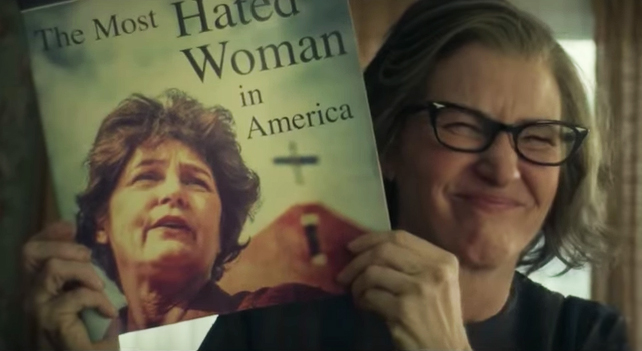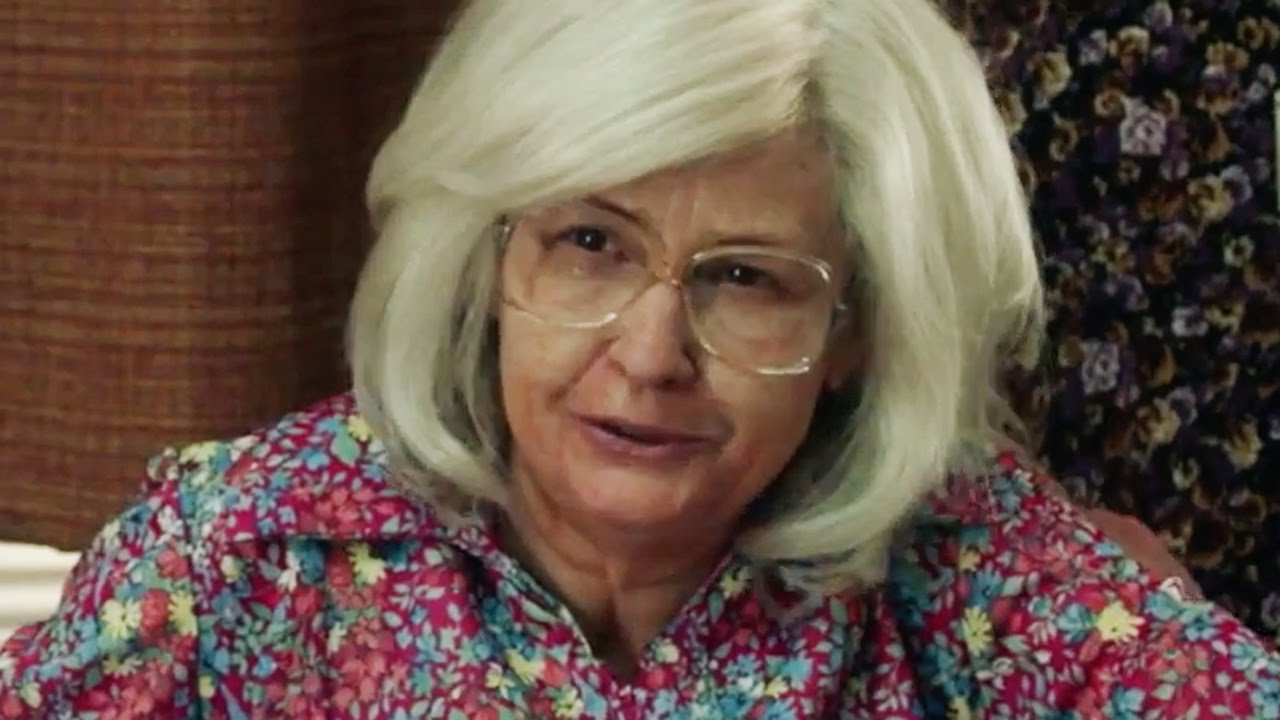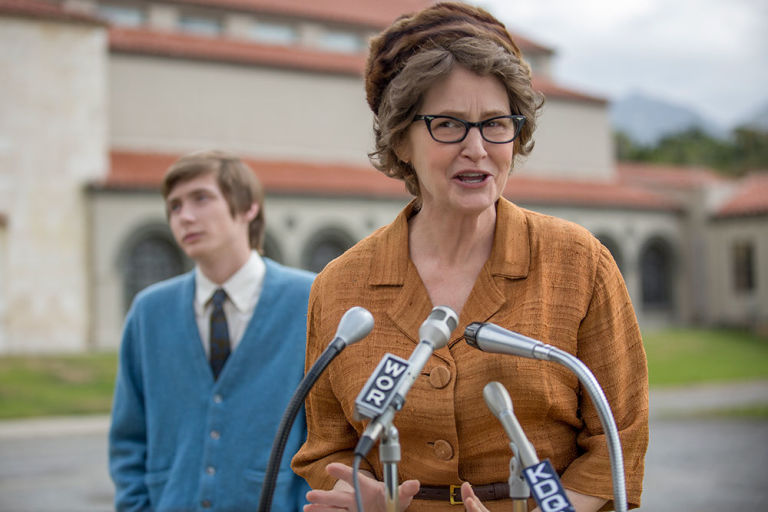By Jose Solís

Few actors can command the screen like Melissa Leo. She has cemented her status as a true scene stealing chameleon in films like The Fighter, Frozen River, Mildred Pierce, and The Big Short. And while she’s mostly regarded as a character, read supporting, actor, she gets a chance to show off her leading lady chops in The Most Hated Woman in America which debuts this week on Netflix. She plays atheist activist Madalyn Murray O’Hair who led a campaign that banned Bible readings in public schools.
Leo infuses the part with heart and courage, so that she becomes a perfect embodiment of the notion that the personal should be political. Director Tommy O’Haver uses Madalyn’s kidnapping and horrific murder, to frame a film that aims to reach everyone’s humanity, regardless of their religious beliefs. Anchored by Leo’s majestic performance, it becomes one of the most important films of the year, in terms of the conversations and debates it could, and should, spark. I had the chance to speak to Leo from SXSW where the film premiered...
JOSE: What made you want to play someone who was thought of as the most hated woman in the country at one point?
MELISSA LEO: I think the title is like Madalyn herself -- you think you know what that means, but maybe you don’t. Why would she be the most hated woman for speaking up for the Constitution of the USA? It’s a very deep and complex question. I don’t know that Melissa Leo needs that title in her list of happy accomplishments, I like to play misunderstood, difficult women, so it was my great pleasure to be asked by Tommy O’Haver to play Madalyn. He adores her, he’s researched her thoroughly, even as we shot, he continued to pour information he found about her. He loves her and that’s who I was going to make the film with. I was also proud to play someone who accomplished so much, and I got to play her from her 30s to her 70s, and you don’t get asked to do that every day of the week.

JOSE: I wasn’t very familiar with Madalyn’s story, so I was shocked to learn her work started with her advocating against obligatory religious activities in her kids’ school, which is something my own father did for me and my brothers when we grew up. I admired her fierce commitment to defending her children’s rights, and wondered if playing her made you reevaluate or remember things about when you were growing up and discovering faith was optional.
MELISSA LEO: I was very well fitted to play Madalyn, just as well suited to play the Reverend Mother I played some months before. I wasn’t brought up on a specific religious faith, so I find that often with the characters I play, my upbringing and my life are the very last thing I consider, if I even think about them or consider them. I’m playing a character and what’s interesting to me is what she thinks and feels about religion, I’m present because I can’t fully actually disappear, but my objective is to become the character. I don’t really know how my upbringing influences my playing of her, perhaps if I’d gone to Catholic school and thought it was a bunch of nonsense, I might have oversold the anti-religious aspect of her. Madalyn was not anti-religion, she was not a believer, she had her own atheist faith and she didn’t want to be told by someone else that she had to have their same faith. That’s what the Constitution says!
I find it so wonderful that the film is coming out at a time when the government is trying to take away people’s rights to believe in what they want, to live open lives, and to practice their own religion. Can you share your thoughts about what it means for the film to come out now?
I certainly appreciate us talking about this! I’m very proud of this particular film in this particular climate. Right at the inception, as our forefathers were dreaming up the Constitution to lead this nation, we were slaughtering the first nation that was already there. I submit that’s not so far from religious oppression. I don’t know if we’ve ever been safe from the government interfering in our faith and beliefs, or non-beliefs. Does that make any sense?
Completely.

So, I agree the film is timely, but this is not something that just began. One of the things that made Madalyn so irate was that the government was moving towards a fundamentalist Christian nation, not long before she took this matter of Christian prayer in public school to the Supreme Court, the government had seen it in their wisdom to put “in God we trust” on our money, to change the words in the Pledge of Allegiance from “one nation, indivisible, with liberty and justice for all” to “one nation, under God”! Whose god? That’s the world I was born in, and I’m almost 60 now, so this has been going on for a long time, the time is now for there to be more Madalyns. It’s time for individuals to stand up and speak out for the rights of all individuals that are citizens here, that hope to be citizens, that have sought refuge in this continent, like my people who arrived 400 years ago.
I love that the movie is on Netflix because people all over the world will get to see it at the same time. In terms of bringing a political message, what are some of the things you appreciate about this distribution platform?
I am very hopeful that this new day of film is a whole new way to get “asses in seats”. As a performer you haven’t done your job until it’s been seen by the audience, so it’s very important, it’s a very interesting way. As things stand now it’s beautiful because with the cost of a movie ticket being $15, it does make it much more available to many more people.The small screen has always had millions more viewers than the big screen, and Netflix is one of these entities that’s taking this notion and doing something. My fear comes to internet connections, and things that seemed more available when they began, now to stream something you need a better system, and you need to pay more. I’m hoping we can move forward and have this notion, which is a beautiful part of the USA, that everyone would have a chance to see this and other films on a very equal footing. Only then will the conversations around movies grow, if only the people who can pay $15 get to see movies, we’re not doing it right. Look who goes to the opera…

The Most Hated Woman in America premieres on Netflix on March 24.